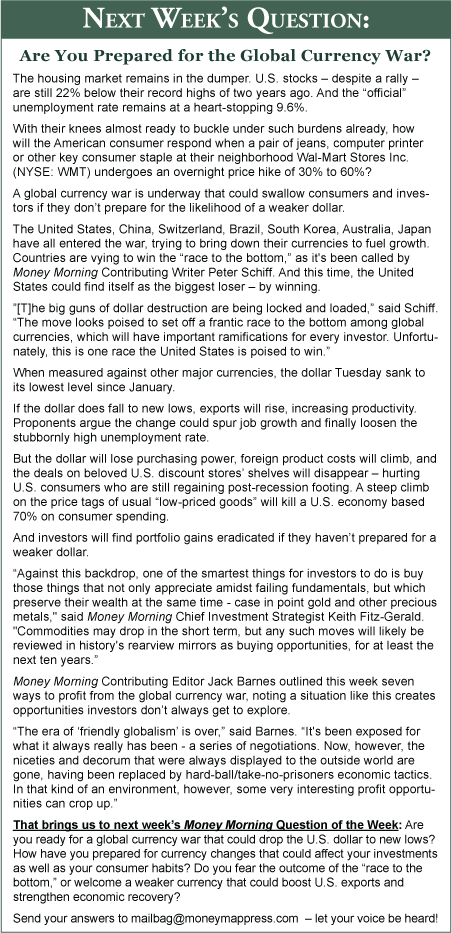The yen strengthened as much as 82.75 per dollar Wednesday, fueled by speculation that the U.S. Federal Reserve would buy more government bonds after a drop in U.S. payrolls.
The yen's rise came after the Bank of Japan tried yet again this week to devalue its currency. On Tuesday the Bank of Japan lowered the benchmark interest rate to "virtually zero," and announced a $60 billion (5 trillion yen) plan to buy government bonds - similar to the 'quantitative easing' policy employed by the U.S. Federal Reserve.
"With today's decision, the Bank of Japan paved the path for the next step," Junko Nishioka, chief economist at RBS Securities Japan Ltd. in Tokyo told Bloomberg News on Tuesday. "What will be critical will be how foreign-exchange rates move as a result," along with the impact of any additional easing by the Federal Reserve, she said.
This is not the first time Japan has made a move to weaken its currency, but its repeated recent attempts have yet to take.

The yen hit a 15-year high in September, and the government sold 2.12 trillion yen last month to slow the surge. Economists noted that since Japan had the markets' attention, it needed to quickly move forward with an economy-strengthening policy.
"The Japanese authorities need to be aggressive now and hit the market hard, fast and furious because as time goes on, the announcement effect will dissipate," David Bloom, global head of foreign-exchange strategy at HSBC, told MarketWatch.
Readers are chiming in on Japan's battle with a rising yen. The following reader comment highlights the sentiment that Japan's currency has nowhere to go but down, and an investment otherwise would be foolish.
The devaluation of the yen is very imminent. It is actually the only thing left for the Japanese government to do to correct the exchange rates, and this is in a climate where speculators in the Forex market signal a target for the yen at 75 against the U.S. dollar. This is the fastest and most idiotic bubble I have seen in ages; there is no substance for that rate at all. The Bank of Japan's issue of yen [last month] can only stimulate the Japanese economy if the consumers use it as credit for consumption, which there is no indication for due to the ongoing deflation.
Devaluation is the only option left for Japan, and any investor in Forex betting for a stronger yen will lose out.
- Anthony B.
There's no question Japan's government will continue to try to lower the yen - but its likelihood of success is up in the air.
The Financial Times examined Japan's uphill struggle in an article Wednesday, noting that in order for Japan's campaign to halt the surging yen to work, inflation and long-term interest rates in the United States need to rise again. But undervalued emerging market currencies are increasing deflationary pressures in the U.S. and other developed nations' economies.

Japanese intervention might temporarily slow the delay of the yen's rise, but the country is up against too many counter moves in the global currency war to be successful. And while the dollar continues to weaken, so will the Chinese yuan, as long as it remains pegged to the dollar.
While a weakening yen may be Japan's main goal, the speculators expecting 75 yen to the U.S. dollar are getting close to that mark - and Japan might have to adapt to life with a stronger yen.
Meanwhile, the Bank of Japan will try more efforts to ease its monetary policy. But with near-zero short-term interest rates, long-term rates in Japan will also fall, choking the banking system that will lose money on lending.
If weakening the yen proves impossible, Japan would need an industrial shift from export-driven growth to domestic consumption.
The undervalued currencies of Japan's neighbors pushed Japanese manufacturers to emerging markets, taking jobs away from home. Finding new domestic need for manufactured goods would boost the sector and fuel growth from within - without relying as much on the import needs of competing nations.
"There's a basic dilemma for the world as everyone wants to export their way out of trouble and can't," Jim O'Neill, chief economist at Goldman Sachs Group Inc. (NYSE: GS), told Bloomberg. "It's a very sensitive topic for the developed countries and markets."
But shifting from an export-driven economy would not be an easy or quick endeavor, meaning the global currency war will continue heating up in the short-term.
(**) Money Morning editors reserve the right to edit responses for grammar, length and clarity when posting on our Web site. Please include your name and hometown with your email.
News and Related Story Links:
- Financial Times:
Japan is facing an uphill struggle to weaken yen
- Money Morning News Archive:
Global Currency Stories
- Money Morning Archives:
Money Morning Mailbag Feature


